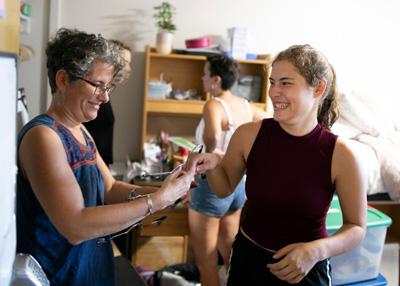Parents and Families
Parents, families and guardians play vital roles in the college search process and we’re so excited to join in this experience with you.
Here for you
The college search process is going to be emotional. But you probably already know that. We hope you also know that you’re not alone.
For every challenge or stressful decision you and your student face, we also want you to laugh, be inspired and build positive memories together. Not only are many of us at Skidmore parents ourselves, but we’ve met thousands of parents in our time and can confidently say: It will all work out.
Below you will find some advice and resources we hope will help. The most important takeaway is that we’re here for you, too, and we’re only an email or call away. Please always feel welcome to contact us directly.

Here for your student
It’s our hope that prospective Skidmore students — emerging adults moving toward greater independence — take the lead in their college search. Because, in our experience, students who take responsibility for their futures are best positioned to “own” their college choices and thrive.
This means we will reach out to them first, frame our communications for them and expect to hear directly from them. You will still have a major role to play (they are probably going to need plenty of reminders and advice), but it’s important that we let them take each step first.

navigating the college process
We offer a number of ways to get to know Skidmore before applying or arriving. Whether your student is more interested in snail mail, being a quiet social media follower or is eager to be seen and heard, encourage them to take advantage of what’s available to them. We love questions. But it’s up to them to ask.
The closer your student is to making their college decision, and especially once they’ve chosen Skidmore, familiarizing yourself with campus resources will help you confidently point your student in the right direction if they come to you with a question. By referring them to a campus contact, you’re empowering them to solve their own problems. And, you’ll also know who you can reach out to if needed.
Guiding your student to more independence means simultaneously having less control. However, you do still have tremendous influence on their behavior. Consider spending time during your college decision process discussing healthy habits and expectations around topics like sleep, mental health, peer pressure, academic achievements and more. While you cannot force your student to behave exactly as you would want them to, sharing your values early and often can set a tone for their entire college experience.
These very well may be “the best four years of their life.” But, it could take a few years for them to appreciate that. The first year especially can be full of indecision, insecurities, disappointments and mistakes. Leaving the door open, and the bar low, means they may be less afraid to fail and instead stumble through discoveries, inspirations and exciting opportunities. The highs and lows of college life are a critical part of your student’s development. Setting expectations early that there will be highs and lows is a great place to start.
College is a time for students to discover who they are. Finding oneself is a difficult enough process without feeling that the people whose opinions you respect most are second-guessing you. If they’re stuck in a cycle of guessing, tease out a few solutions, but consider encouraging them to keep trying because you believe they will find their way.
More Resources
From faculty research to student stories, there's always something creative happening on campus. Read the latest news and updates.